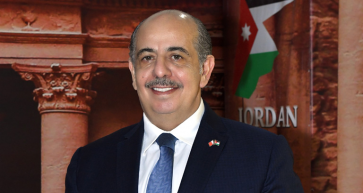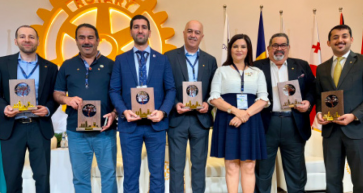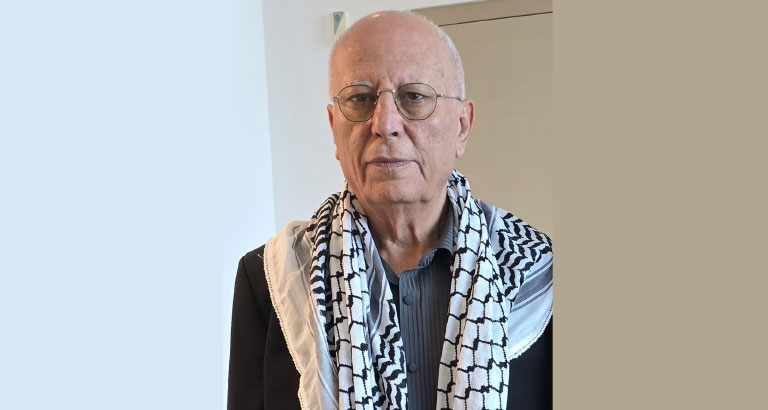
Karim Younis’s Journey for Peace and Justice
Karim Youssef Fadl Younis, a Palestinian citizen of Israel, recently stepped out of the shadows after serving 40 years in Israeli prisons. His story is one of endurance, conviction and unwavering commitment to his cause.
On a visit to Bahrain last month, he spoke to publisher George F. Middleton.
In this exclusive interview, we delve into the life of the second longest-serving Palestinian prisoner and explore the impact of his incarceration.
Karim Younis, the second-longest-serving prisoner ever in an Israeli jail, possesses an extremely calm demeanor for someone who has gone through so much in his 67 years of life. “I think that’s because four decades in prison teaches you to be a little patient,” he smiles.
Younis is an extremely significant figure for Palestinians. He authored political works advocating for dialogue and agreements between Palestinians and Israelis. His writings resonated with fellow inmates and the broader Palestinian community. Younis’s voice transcended prison walls, urging for peace and understanding amidst the conflict. His unwavering spirit and commitment to justice sustained him through the darkest of days.
The distinguished and resolute figure in front of me looked strong and determined, belying the fact that he had spent all but one of the previous 41 years in an Israeli jail. With an extended family consisting of his siblings’ children and grandchildren, although with none of his own, Karim reflects on the changes that have taken place over the last forty years.
Originally from ‘Ara, a predominantly Arab village within the pre-1948 Israeli borders, his life took a dramatic turn on June 1, 1983, when Israeli authorities arrested him at school together with his cousin Maher.
“Everyone is different and everything is different,” he says. “Forty-four years ago, I used to live in a village with houses every 400 to 500 meters and trees, and now... my village is a town with all the houses stuck together. The cars, the streets, everything has changed…. even the people,” he laments.
I was curious to know what it was like for Karim Younis, the Palestinian Mandela, on his release from prison after being deprived of his freedom for so long.
“Without a doubt,” he replied, “the feeling of freedom after 40 years is indescribable, but it’s not just freedom of movement that we are talking about here. Freedom is not complete until everyone is free,” he says.
We then went on to ask him what he had learned and how his life had changed due to this whole experience. He responds, “There are many things. But, most of all, after 40 years of imprisonment, my sense of national pride at being a Palestinian increased dramatically.”
Since he possessed an Israeli passport, he was allowed visits from his parents in prison. However, his father died 10 years ago on the same day that he would ultimately be released a decade later, and then his mother passed away only six months prior to his release.
Karim believes that a majority of the Israeli people supported the concept of peace and security with Palestinians at the time, which led up to the Oslo Accords. Now, however, he suggests that sentiment has gone the other way, with at least 70 percent of the Israeli population supporting the government’s uncompromising stance.
According to Karim, Jewish and Israeli activists who stand resolutely against Israeli Zionist oppression are very much in the minority. Those few remaining, who still call for social justice, equality, and peace, have severely declined since the days of Rabin when the peace process was on track.
Karim argues that there are two schools of thought in the Israeli political world. The first decision taken after the occupation by the Israeli government in 1967 was that the occupied Arab and Palestinian lands would be controlled temporarily until a peace deal was achieved. That was the Israeli government’s perceived policy at the time.
The Israeli Labour Party, in the meantime, was encouraging all Arab neighbours to cooperate with them “In order that we can give you peace and we can give the Palestinian people peace,” says Karim. The Arabs were told that they needed to make concessions, and the implication was that these concessions would ultimately lead to a permanent and just peace for all concerned.
According to Karim, the Labour Party, which instigated this plan, now has five serving members in the Israeli Knesset today. Furthermore, he wagers that these five members are more focused on discussing climate change issues than bringing about true peace and justice to the region.
Extremism has taken over the right in Israeli politics, and these far-right fundamentalists are now promoting the concept of a greater Israel well beyond its current borders. Expansionism is their aim, and compromise seems out of the question.
Karim acknowledges the fact that in the last 20 years, the Israeli government has tried to make peace on occasions. He believes that all efforts have failed since the Oslo Agreement is no longer seen as a viable option.
“Palestinians on the West Bank continue to have their lands and homes taken away from them. The settlers encroach on what little is left of the proposed Palestinian State via the ongoing establishment of small cantons. Unfortunately, the Israeli right-wing, led by the likes of Itamar Ben Gvir and Bezalel Smotrich, are even more extreme in ideology than Netanyahu himself, who was always against any viable peace agreement from the very beginning. It seems to me that the extreme Zionist objectives are nothing less than the total submission, humiliation and surrender of Palestinians”, he says.
He continues, “When the people of Gaza, made up of generational descendants of dispersed refugees from other parts of Palestine, made it clear that they preferred to die where they were instead of leaving, the authorities agreed that transfers would be voluntary.”
“The extremists have made conditions so unbearable that we are now witnessing severe shortages of food and water, resulting in misery on an unimaginable scale.”
According to Karim, 60 percent of all homes were demolished, and almost 80 percent of institutions, including schools and hospitals, have been destroyed. He believes that what is happening in Gaza today is an enforced exodus aimed at squeezing them so badly that they will eventually give up. Israel is banking on the fact that these conditions will result in the voluntary departure of all Palestinians from the area.
I asked Karim what his most optimistic hope was for a future resolution to this issue. He replied, “On October 7, the invincibility of Israel was called into question. And without external support, the Israelis were seen as fallible through the mirrored reflection of social media.”
“Gaza has shown this,” he says, “But we want peace. The international two-state solution has been supported by us historically. The PLO has been supporting this process, but unfortunately, nothing has been implemented yet. We are willing and able to support a serious initiative in this regard.”
In recent times, Palestinians face severe restrictions and repercussions for political actions, even those conducted peacefully and legally. Authorities closely monitor social media. “Over 120 Palestinian students were expelled from Israeli universities recently, including doctors and nurses, due to their political activities,” he says.
Peaceful protests, even those previously permitted, are retrospectively punished. Participants from five years ago are being arrested now. This has led to widespread job losses among professionals who support Palestinian causes.
“All these individuals being targeted are Israeli citizens, highlighting the conditions they face. Settlers, armed with M16 rifles and 450,000 bullets, are given free rein to attack Palestinians and their property without facing legal consequences. The military often supports these settlers, blocking humanitarian aid and enabling violence,” he states.
“In conflicts, settlers can retaliate violently, often with military backing, resulting in significant destruction of Palestinian property and towns,” says Karim. “Even when settlers engage in criminal acts, such as stopping aid trucks and destroying food, they are not held accountable.”
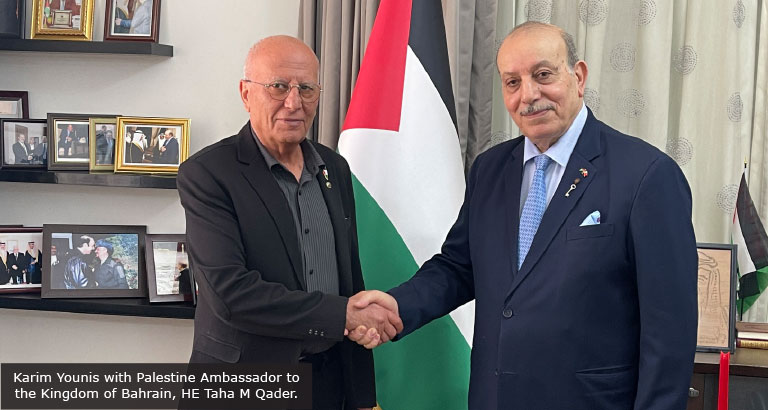 “Overall, Palestinians endure systemic harassment, violence, and legal persecution for any pro-Palestinian activities, reinforcing the severe restrictions and discrimination they face. There is no due process as is the case in the USA or Europe, for instance,” he continues.
“Overall, Palestinians endure systemic harassment, violence, and legal persecution for any pro-Palestinian activities, reinforcing the severe restrictions and discrimination they face. There is no due process as is the case in the USA or Europe, for instance,” he continues.
“For years, the various governments led by Benjamin Netanyahu took an approach that divided power between the Gaza Strip and the West Bank—undermining Palestinian Authority President Mahmoud Abbas and thereby preventing him; or anyone else in the Palestinian Authority’s West Bank government for that matter; from advancing toward the establishment of a Palestinian state,” he concludes.
The debate surrounding Younis’s status underscores the complexities of identity, justice, and reconciliation in the region. As a symbol of resilience, Karim Younis’s journey reflects the broader struggle of Palestinian prisoners.
According to Israeli reports, approximately 4,700 Palestinians remain in Israeli jails and detention centers, including 150 minors and 835 administrative detainees who have not been charged or tried. Younis’s sacrifice echoes through their stories, reminding us that every prisoner represents an entire people.
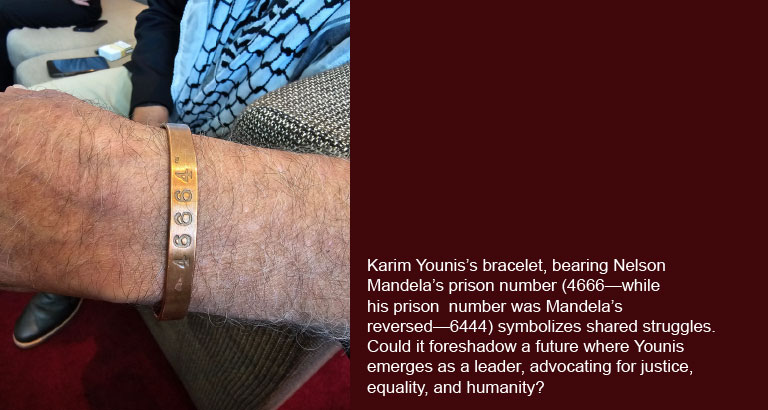 Similar to that of Nelson Mandela, Karim Younis’s life has been a tapestry woven with resilience, determination, and unwavering advocacy. His journey spans decades, marked by imprisonment, struggle, and an unwavering commitment to justice. As the world watches, we hope that justice will prevail, and the legacy of those who fight for a better future will endure.
Similar to that of Nelson Mandela, Karim Younis’s life has been a tapestry woven with resilience, determination, and unwavering advocacy. His journey spans decades, marked by imprisonment, struggle, and an unwavering commitment to justice. As the world watches, we hope that justice will prevail, and the legacy of those who fight for a better future will endure.
Karim Younis’s 40-year incarceration had profound effects on his life. The relentless confinement, isolation, and uncertainty took a toll on his physical and mental well-being.
Yet, amidst the darkness, his unwavering commitment to justice and resilience sustained him. He emerged as a symbol of endurance, challenging the status quo and advocating for Palestinian rights. His story underscores the human cost of prolonged imprisonment and the urgent need for a just resolution to the Israeli-Palestinian conflict.

